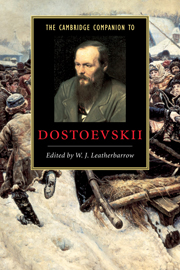Book contents
- Frontmatter
- 1 Introduction
- 2 Dostoevskii and the Russian folk heritage
- 3 Dostoevskii and literature
- 4 Dostoevskii as a professional writer
- 5 Dostoevskii and money
- 6 Dostoevskii and the intelligentsia
- 7 Dostoevskii and psychology
- 8 Dostoevskii and religion
- 9 Dostoevskii and the family
- 10 Dostoevskii and science
- 11 Conclusion
- Further reading
- Index
3 - Dostoevskii and literature
works of the 1840s
Published online by Cambridge University Press: 28 May 2006
- Frontmatter
- 1 Introduction
- 2 Dostoevskii and the Russian folk heritage
- 3 Dostoevskii and literature
- 4 Dostoevskii as a professional writer
- 5 Dostoevskii and money
- 6 Dostoevskii and the intelligentsia
- 7 Dostoevskii and psychology
- 8 Dostoevskii and religion
- 9 Dostoevskii and the family
- 10 Dostoevskii and science
- 11 Conclusion
- Further reading
- Index
Summary
Dostoevskii's correspondence of the 1840s, and in particular the letters sent to his brother Mikhail, to whom he was especially close both emotionally and intellectually, disclose an individual acutely sensitive to his role as a budding author. On the most immediate level the letters reveal Dostoevskii's keen awareness of the economic realities of the profession he has decided to adopt. References to money, indebtedness and publishers' advances are everywhere, alongside the occasional and not entirely convincing assertion that he writes primarily for money: 'What's the point of fame here, when I'm writing to earn a crust?' (xxviii/1, 106; letter of 24 March 1845). He describes the writer's relationship to the publisher as that of a slave to his master (xxviii/1, 128; 7 October 1846) and even draws attention to the alarming number of German poets who have died of hunger and cold or have ended up in asylums (xxviii/1, 108; 24 March 1845). Behind these details we can discern Dostoevskii's emerging awareness of himself as a figure in an established literary tradition. He constantly refers to and compares himself to other writers, both European and Russian: he relates his financial hardship to that experienced by Pushkin and Gogol before their fame was secure (xxviii/1, 107; 24 March 1845); in revising for the umpteenth time his drafts of Poor Folk, he justifies himself by reference to the writing and rewriting practices of Chateaubriand, Pushkin, Gogol and Laurence Sterne (xxviii/1, 108; 4 May 1845); he draws comfort from the fact that the hostility aroused in some quarters by his novel is no worse than that experienced by Pushkin and Gogol; and he is sensitive to the fact that he is in competition with several other new writers such as Goncharov and Herzen (xxviii/1, 120; 1 April 1846). With the success of Poor Folk he also becomes extravagantly aware of his own fame and pre-eminence in contemporary Russian literature.
- Type
- Chapter
- Information
- The Cambridge Companion to Dostoevskii , pp. 47 - 65Publisher: Cambridge University PressPrint publication year: 2002

